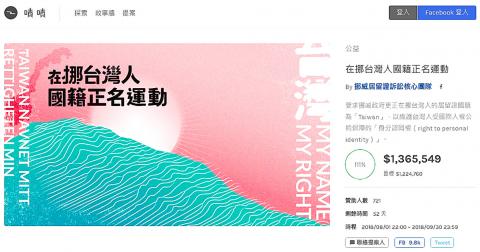The Ministry of Foreign Affairs yesterday said that the government is keeping close contact with Taiwanese students in Norway who are raising funds to sue the Norwegian government after it labeled them as being from China.
According to a Facebook page created by the students, the Norwegian government changed their residency cards to read “Kina/Taiwan.” Kina is the Norwegian word for China.
Despite protesting to the Norwegian Directorate of Immigration and lawmakers, the students did not receive a positive response.

Photo: Lu Yi-hsuan, Taipei Times
In March last year, they filed a petition with immigration authorities, saying that the government’s disrespect of the Taiwanese people’s identity has contravened its own constitution, the European Convention on Human Rights and the International Covenant on Civil and Political Rights.
“However, the Norwegian government repeatedly delayed the process and then dismissed our petition on the grounds that ‘such designation does not affect the interested party’s rights and obligations in Norway,’” they said.
The group on Wednesday last week launched an online crowdfunding campaign to raise money to take the case to court in Norway, which they said would be costly and could take three to four years.
As of press time last night, the group had raised about NT$1.36 million (US$44,407), more than their first-phase target of NT$1.22 million. Their ultimate goal is NT$4.88 million.
“In the face of China’s overwhelming pressure, this is the first giant step toward Taiwanese people’s awakening. If you care about Taiwan’s national subjectivity and are willing to fight for Taiwan against the many injustices it suffers in the international arena, you are welcome to join us,” the group said on the crowdfunding site.
Ministry spokesman Andrew Lee (李憲章) told local media that the ministry has been talking with the Norwegian government over the issue via its representative office in Sweden and is urging it to amend the name as soon as possible.
Taiwan’s representative office in Norway was closed in September last year as part of the ministry’s ongoing plan to streamline its structure. The office in Sweden is responsible for affairs in Norway.
The ministry has also continued to keep close contact with the students and would offer all necessary assistance, Lee said.
The group leader said they are aware of Taipei’s stance.
Lee also expressed the ministry’s appreciation for the group’s efforts to file a lawsuit.

The US government has signed defense cooperation agreements with Japan and the Philippines to boost the deterrence capabilities of countries in the first island chain, a report by the National Security Bureau (NSB) showed. The main countries on the first island chain include the two nations and Taiwan. The bureau is to present the report at a meeting of the legislature’s Foreign Affairs and National Defense Committee tomorrow. The US military has deployed Typhon missile systems to Japan’s Yamaguchi Prefecture and Zambales province in the Philippines during their joint military exercises. It has also installed NMESIS anti-ship systems in Japan’s Okinawa

‘WIN-WIN’: The Philippines, and central and eastern European countries are important potential drone cooperation partners, Minister of Foreign Affairs Lin Chia-lung said Minister of Foreign Affairs Lin Chia-lung (林佳龍) in an interview published yesterday confirmed that there are joint ventures between Taiwan and Poland in the drone industry. Lin made the remark in an exclusive interview with the Chinese-language Liberty Times (the Taipei Times’ sister paper). The government-backed Taiwan Excellence Drone International Business Opportunities Alliance and the Polish Chamber of Unmanned Systems on Wednesday last week signed a memorandum of understanding in Poland to develop a “non-China” supply chain for drones and work together on key technologies. Asked if Taiwan prioritized Poland among central and eastern European countries in drone collaboration, Lin

The Chien Feng IV (勁蜂, Mighty Hornet) loitering munition is on track to enter flight tests next month in connection with potential adoption by Taiwanese and US armed forces, a government source said yesterday. The kamikaze drone, which boasts a range of 1,000km, debuted at the Taipei Aerospace and Defense Technology Exhibition in September, the official said on condition of anonymity. The Chungshan Institute of Science and Technology and US-based Kratos Defense jointly developed the platform by leveraging the engine and airframe of the latter’s MQM-178 Firejet target drone, they said. The uncrewed aerial vehicle is designed to utilize an artificial intelligence computer

Renewed border fighting between Thailand and Cambodia showed no signs of abating yesterday, leaving hundreds of thousands of displaced people in both countries living in strained conditions as more flooded into temporary shelters. Reporters on the Thai side of the border heard sounds of outgoing, indirect fire yesterday. About 400,000 people have been evacuated from affected areas in Thailand and about 700 schools closed while fighting was ongoing in four border provinces, said Thai Rear Admiral Surasant Kongsiri, a spokesman for the military. Cambodia evacuated more than 127,000 villagers and closed hundreds of schools, the Thai Ministry of Defense said. Thailand’s military announced that